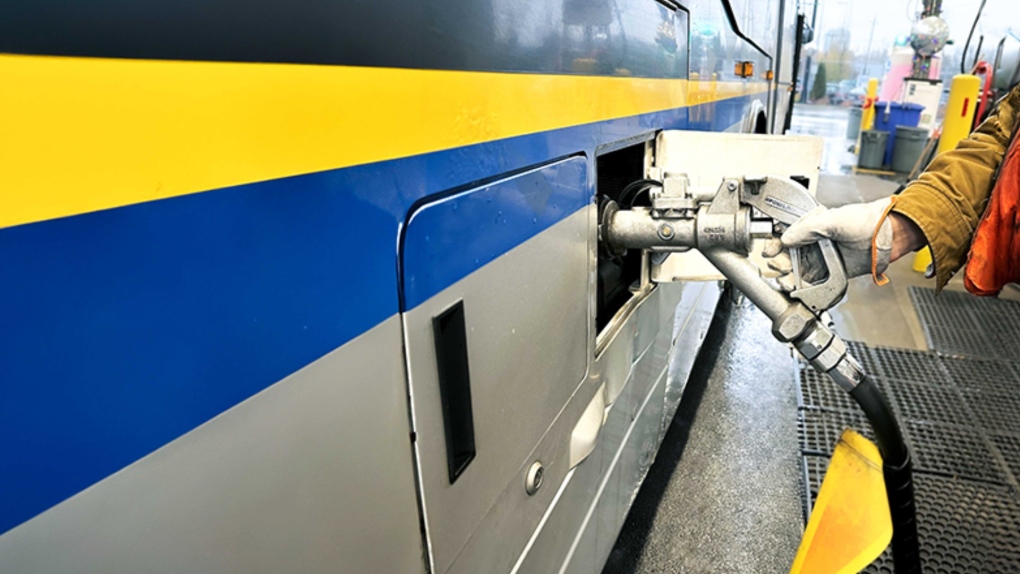TransLink converting Surrey bus depot to 'renewable diesel' in the New Year
 A TransLink bus is refueled in this image shared by the organization.
A TransLink bus is refueled in this image shared by the organization.
Metro Vancouver's transit provider says one of its bus depots will be refueling exclusively with renewable diesel made from organic waste starting Jan. 1.
TransLink says using renewable diesel – which comes from used cooking oil, waste animal fats and vegetable oils – reduces greenhouse gas emissions by 80 per cent compared to fossil fuel diesel.
The switch to renewable diesel at Surrey Transit Centre will reduce greenhouse gas emissions by 6,550 tonnes – roughly five per cent of TransLink's total emissions – according to a news release issued Thursday.
TransLink says that's the equivalent of taking 1,900 passenger vehicles off the road.
"The time to take climate action is now," says Kevin Quinn, TransLink's CEO, in the release.
"By introducing renewable diesel to our bus fleet, we’re doing our part to move away from fossil fuels. Renewable diesel will deliver rapid GHG reductions while we work to electrify our fleet."
TransLink's Climate Action Strategy calls for a 45-per-cent reduction in emissions from 2010 levels by 2030, and a switch to a zero-emission fleet by 2040.
The organization says it plans to convert additional transit centres to renewable diesel next year. It's also studying the possibility of using renewable diesel as a fuel source for the West Coast Express and SeaBus.
According to TransLink, cars, light trucks and SUVs are responsible for one-third of all greenhouse gas emissions in Metro Vancouver. TransLink itself is responsible for about one per cent of the region's emissions.
Nearly two-thirds (64 per cent) of TransLink's emissions come from its diesel vehicles.
CTVNews.ca Top Stories

Landslide closes B.C.'s Sea to Sky Highway; reception centre opened for stranded travellers
A landslide shut down the Sea to Sky Highway in both directions near Lions Bay Saturday morning, and authorities expected the road to remain closed for at least the rest of the day.
Montreal man died of aneurysm after waiting 6 hours in ER
A 39-year-old Montreal man died of an aneurysm after spending six hours in an emergency room before giving up and going home.
Canada Post union negotiator balks at labour minister's calling for a 'time-out'
This week, Labour Minister Steven MacKinnon announced a 'time-out' in the ongoing Canada Post strike. In a way, Canadian Union of Postal Workers (CUPW) negotiator Jim Gallant says he agrees with that phrasing.
'We called a Code Silver': LHSC goes into lockdown after shooting outside emergency department
The emergency department (ED) doors at LHSC Victoria Campus were being repaired Saturday morning after a person fired a gun into the glass.
ABC agrees to give US$15 million to Donald Trump's presidential library to settle defamation lawsuit
ABC News has agreed to pay US$15 million toward Donald Trump’s U.S. presidential library to settle a lawsuit over an inaccurate on-air assertion that the president-elect had been found civilly liable for rape.
YouTube singer arrested in Iran after performing an online concert while not wearing a hijab
Iranian authorities have arrested a female singer who performed a virtual concert on YouTube, a lawyer said.
British departure means uncertain future for Alberta's massive Suffield military base
A sprawling military training base more than twice the size of New York City in southeastern Alberta appears to be a shadow of its former self while its future use remains up in the air.
Enbridge pipeline spills 70,000 gallons of oil in Wisconsin
Roughly 70000 gallons (264,978 litres) of oil from a pipeline spilled into the ground in Wisconsin, officials said.
Woman accusing Jay-Z and Sean 'Diddy' Combs of sexual assault acknowledges inconsistencies
A woman accusing rappers Jay-Z and Sean “Diddy” Combs of sexually assaulting her when she was 13 has acknowledged certain inconsistencies in her story.






























